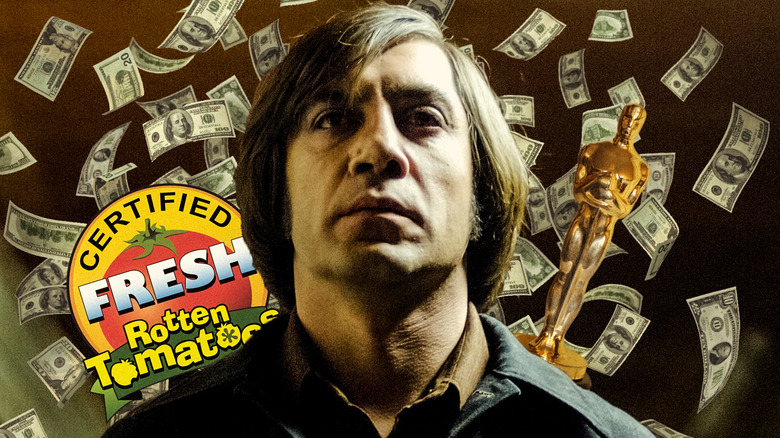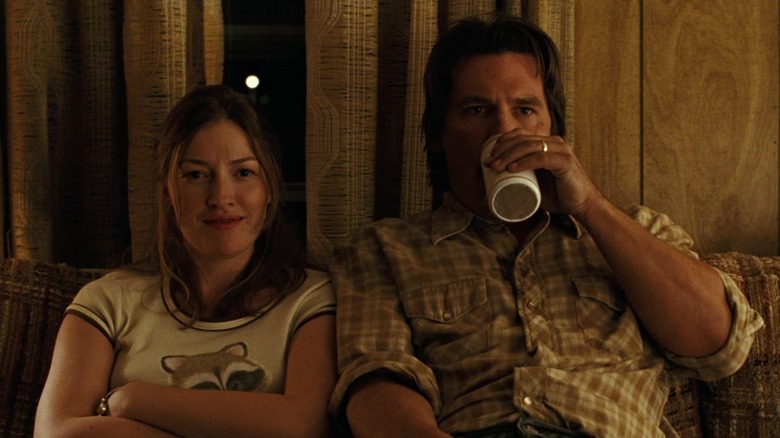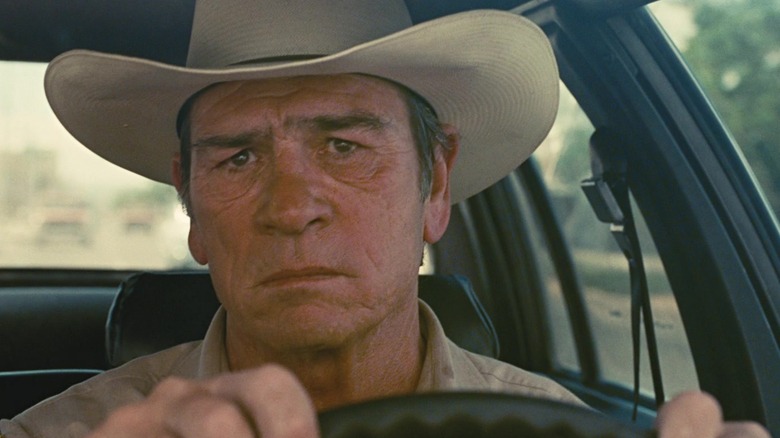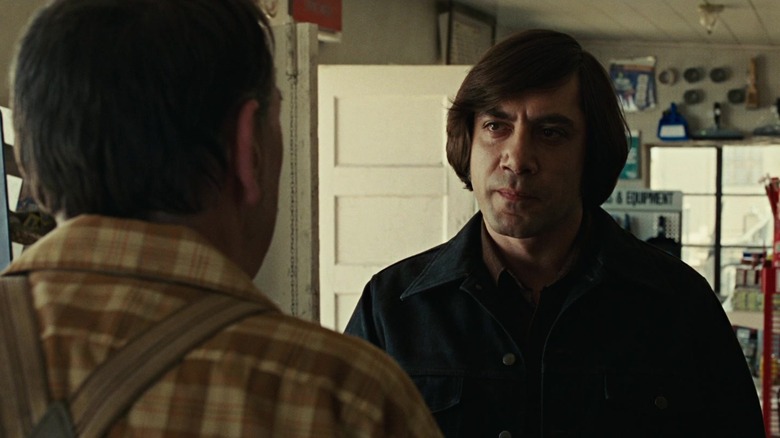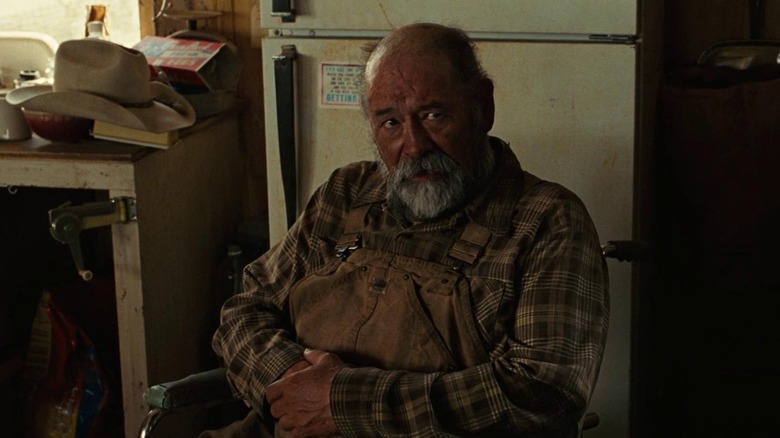Tales From The Box Office: No Country For Old Men Must Have Sold Its Soul To The Devil
(Welcome to Tales from the Box Office, our column that examines box office miracles, disasters, and everything in between, as well as what we can learn from them.)
Even the greatest filmmakers only get to have their names attached to something that will go down as one of the greatest movies of all time once, if they're very lucky. Only guys like Steven Spielberg and Alfred Hitchcock – the rarest of the rare – get to claim a few. For directors Joel and Ethan Coen, aka the Coen brothers, their moment came in 2007 with "No Country for Old Men" which, quite arguably, remains their best film to date in the eyes of the masses.
As the directors behind beloved classics such as "Fargo" and "The Big Lebowski," the duo had already put their stamp on cinema in a pretty significant way. But something very special happened when they teamed up with acclaimed author Cormac McCarthy to adapt his 2005 novel of the same name. What resulted was one of the best films of the last 25 years that went on to also become a huge financial success and, to top it all off, took home Best Picture at the Oscars. A success on every single level a film could possibly be considered successful. The whitest of white whales in the movie business.
In honor of the movie's 15th anniversary this week, we're looking back at the film, how it came to be, how everything lined up just so to create a once-in-a-generation kind of hit, and what lessons we can extract from it all these years later. Let's dig in, shall we?
The movie: No Country for Old Men
Let's rewind the clocks a bit. The Coens were coming off 2004's "The Ladykillers" which, all due respect, is probably still considered a low point for them. So, they set about doing their first-ever full-length adaptation of a novel (that would actually get made). Aside from being great directors, the two often would write scripts that didn't get made. Such was the case with several attempted adaptations of other novels. But they were focusing on James Dickey's "To the White Sea" when producer Scott Rudin came calling.
Rudin had purchased the rights to McCarthy's novel and approached the Coen brothers about adapting it. They sparked to the material and it was off to the races. The key thing is that the directors really, really took to what McCarthy had put on the page. So much so that they were extremely faithful to the source material in adapting it as a screenplay. Speaking in 2007, Joel Coen joked about just how faithful they were.
"Ethan once described the way we worked together as: one of us types into the computer while the other holds the spine of the book open flat. That's why there needs to be two of us – otherwise he's gotta type one-handed. That's how you 'collaborate' with someone else."
The key difference is that the novel really is centered on Sheriff Tom Bell, played by Tommy Lee Jones in the film, whereas the movie sort of spreads the love, with Josh Brolin's Llewelyn Moss serving as the closest thing we have to a protagonist. Then, of course, there's Javier Bardem's star-making (ultimately Oscar-winning) turn as the cold-blooded murderer Anton Chigurh. And when your cast also includes the likes of Woody Harrelson, Kelly Macdonald, and Stephen Root, you know something good is about to happen. But could any of us possibly have predicted just how good it was going to be?
The stars align
The film was a co-production between Miramax which, pre the Harvey Weinstein scandal, was an absolute powerhouse in this department, and Paramount Vantage, the studio's "classics" division. They split the $25 million budget right down the middle, with Miramax taking domestic rights and Paramount distributing the film internationally. Oh and did we mention that Roger Deakins, the greatest living cinematographer and maybe the greatest to ever do it, shot the movie? Just a little detail worth mentioning. Though he had worked with the Coen brothers a lot previously so his involvement wasn't a huge surprise.
After filming in Texas and New Mexico in 2006, "No Country for Old Men" held its premiere at the Cannes Film Festival in May 2007. From that point on, it was clear that something special was happening. While it didn't take home the top prize, the film garnered absolutely rave reviews from critics in attendance, with buzz beginning to build. To offer some idea, the film still holds a 93% approval rating on Rotten Tomatoes. And many of these reviews were downright glowing, with Sight & Sound saying it is a "pitch-perfect thriller that delivers the pleasurable fear and suspense expected of the genre even as it sends its conventions to the shredder."
Though it was perhaps The Independent that put the film's somewhat divisive ending into focus saying, "Yes, you should probably see No Country for Old Men, even if it does bow out with a baffling little coda featuring an old timer's meditation on the fact that he's estranged from his father." Even if that ending left some audience members feeling cold, it wasn't nearly enough to derail this train destined for the land of greatness.
The financial journey
There was no big opening weekend for "No Country for Old Men." It got what we call a platform release, which is becoming less of a thing these days. Basically, it was released in a few theaters, then slowly expanded as demand grew. It opened in the U.S. on November 9, 2007, and earned $1.2 million in just 28 theaters. It only registered at number 15 on the charts in a week when "Bee Movie" came out on top. A different time.
But the movie grew and grew in the coming weeks, peaking on Thanksgiving weekend with a $10.6 million haul. But the declines were minimal and the movie kept putting meat in seats until it ultimately won Best Picture at the Oscars in early 2008, beating out other truly wonderful movies like "There Will Be Blood" and "Michael Clayton." It also won Best Director(s) and Best Adapted Screenplay, punctuating an incredible run to some degree. Though more accolades would come later as the film earned a spot on many "best of the decade" lists after the fact.
In the end, from a financial standpoint, this was a home run. It earned $74.2 million domestic and a stellar $97.3 million internationally for a grand total of $171.6 million. Or, to put it another way, 6.6 times its production budget. Not to mention that it has generated a reported $54.3 million in domestic home video sales, let alone cable rights, international sales, and other revenue streams. A win in every single way a movie could hope to win, no two ways about it. This is the dream of all studios when they work with filmmakers like Joel and Ethan Coen.
The lessons contained within
Let's get this out of the way up top: recreating or engineering this kind of success is a fool's errand. It's impossible and simply should not be attempted. I can't imagine how many meetings at big studios had some exec saying, "Where's our No Country for Old Men?" It won't exist, it can't be found in a pile of ignored scripts, and there is no willing this kind of thing into existence. It's the stars aligning in a one-in-a-billion sort of way. Just be happy if it ever does happen, Hollywood people.
But there are two applicable lessons that were key to the film's success, as I see it, going back over its journey. First and foremost, everyone had the good sense to faithfully adapt McCarthy's novel, from Rudin to the Coens and everyone at two powerhouse studios. Nobody got in the way. That book worked like gangbusters, why not ensure that spirit stays alive in the adaptation? Let that text be your guide. As easy as that sounds, it's miraculous how often in the age of IP-driven cinema adaptations just miss the mark by straying from the path. That's not to say everything needs to be word-for-word and beat-for-beat, but why adapt something if you're just going to change it dramatically? There's little sense in that.
Second, the platform release benefited this movie greatly. Yes, things have changed but opening every movie wide is like a death sentence for original, adult-driven cinema in the modern age. More studios need to give platform releases a shot as it can absolutely work. It was a key to the success of "Everything Everywhere All at Once," while going wide with something like "Men" almost certainly helped to doom it.
So, no, this kind of all-around success can't be replicated, but some of the tools used in crafting that success can (and should!) indeed be implemented in the modern era.
